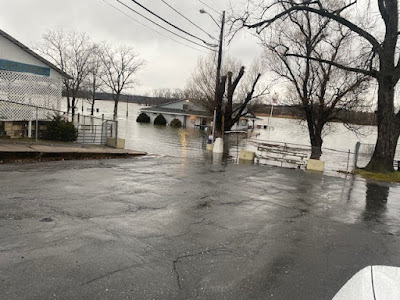We've received warnings about flooding, and it's happening. Reports are that Route 9G heading out of town is closed, so if you need to head south, you must go by way of Route 9.
Before the sun set and it got dark, this is how things looked at the waterfront--at riverfront park, the state boat launch, and the Furgary Boat Club.





That's a high high tide. Wow.
ReplyDeleteMaybe all the shacks will finally get swept out to sea.
ReplyDeleteSo now that the Hudson Powerboat Association building looks to be a tear down, does that mean they lose their lease on the most valuable property in Hudson or do they keep their choke hold on the City and continue to prevent our waterfront from real development?
ReplyDeleteThe HPBA owns its property. And from where its members sit, I among them, it’s perfectly developed. And our house will be fine but thanks for your concern.
DeleteI think you didn't mean to say the "Furgary Boat Club", but rather the decayed, hazardous, neglected ruins of the Furgary Boat Club, that our city govt. has failed to recover and convert to a park for over a decade - after spending a ton of money on a lawsuit and getting legal possession of it. There it rots. Might as well put a fence around it and make it a part of the sewer plant.
ReplyDeleteP. Winslow, perhaps on this point alone you and I agree: that the deterioration of the shacks is a blight on a succession of city governments. Not least among them are those local politicians and officials who delayed this meagerest of DRI-winning projects in hopes that the shacks would collapse on their own, without the further care assured by the DRI award.
DeleteBut what you and they never seem to grasp, or probably just ignore, is that nearly all of the DRI money applied for was for the express purpose of removing unwanted shacks - more than half of them - by first remediating them as required by law.
Not that the shacks are any more toxic than your own house (if you have an old asphalt roof or window glaze that can still be purchased at Lowe's), but that NY state requires municipally-owned properties to be remediated to the max.
Point being, it's going to be more expensive for the city to remove all of the shacks than it would have been had those who care about history been allowed to save a handful of them.
Congratulations all haters of vernacular history; now you're really going to pay.
Specious reasoning at best. Who would have maintained them properly for the long term, keeping vandals out, keeping roofs on, windows boarded up repeatedly, etc, and how much would that cost, if even possible? C'mon, they are, have been and always will be a lost cause until they are removed. Leaving them there is just nostalgia for a handful of people and ugly and dangerous for the rest of us. Their time, obviously, came and went long ago.
DeleteB Huston
You don't know a thing about it. All of these eventualities were studied and proposed under different scenarios for each shack. This included alternate budgets, whether this handful of shacks was preserved or that grouping, all based on the particular requirements happily specified in the LWRP (e.g., square-foot equations for each shack's hydrostatic demands).
DeleteNext you'll demand answers and details, but where were you - and everyone else - then, when we could have used everyone's interest?
It's Christmas, so try some humility. Instead, you might feel sorry for the apathy of your neighbors, for entropy in general, and for lost Hudson River history entrusted to our generation.
It's really quite sad. We're not terribly impressive - none of us are - but on Christmas Day we'll try to be forgiving.